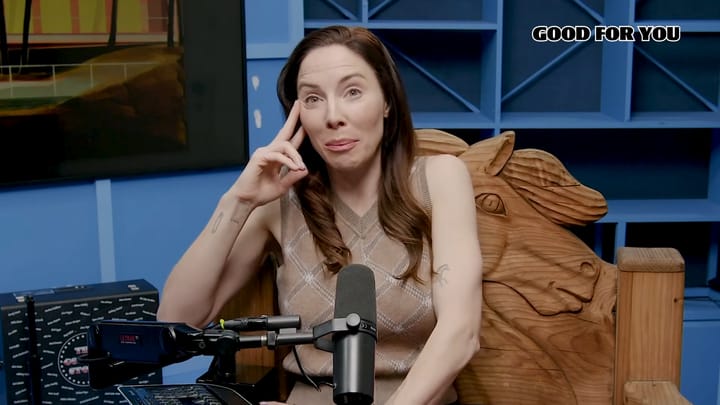Lorne Michaels Doesn't Want to Talk About How Powerful He Is
But he prizes truth-tellers, so.

The author of the Washington Post's glossy new profile of Lorne Michaels apparently tried three times to ask him about his considerable power—to shepherd and destroy careers, to shape the public discourse, to influence generations of comedy workers and then shepherd or destroy their careers. And like Peter before Christ, Michaels three times denied him:
Today is a Tuesday, a writing sprint, and by tomorrow his team will have the beginnings of a show. Wednesday afternoon, at the table read, Lorne will sit at the head and, in the voice of God, mumble aloud the stage directions of each sketch. He’ll be at least 30 years older than anyone else at the table; everyone will look to him for the slightest sign of approval.
At the moment, though, he is enduring a third attempt at a question he has already evaded twice: But what about the power of the show, the power you’ve created for yourself —
“Uh huh …”
— not to just start and stop careers —
“Yesss …”
We can tell you might be resisting this question a bit.
“I am, a little, yes …”
But the power to tell a mass audience, directly or indirectly, how to think, and what is funny and —
Lorne sidesteps again. He prefers not to talk about his own power; he’ll focus on the power of the voices he chooses to elevate. He prizes truth-tellers, he says, especially in moments of national unease or confusion…
I've said it before and I'll say it again: Lorne Michaels is one of the most powerful people in Hollywood, which makes him one of the most powerful people in America. Perhaps the surest sign of his status is how little you hear about it. His reluctance to answer the Post's questions shows he's well aware of this dynamic.
Another sign is how rarely scandal sticks to the man. The Post doesn't even mention that SNL is currently the defendant in a child sex abuse lawsuit, a fact that to my mind raises interesting questions about its role in the cultural pantheon. Nor does it mention Chris Kattan's allegations that Michaels pressured him to sleep with Amy Heckerling. It does not mention the olive branch (and personal apology) Michaels extended to neofascist Dan Crenshaw, his downplaying of the Harvey Weinstein revelations, his hiring of an out-and-out racist to appeal to conservative audiences, or his insistence that SNL perform in studio for a live audience at the height of the pandemic—an arrangement he made with the express help of disgraced former governor and sexual harasser Andrew Cuomo.
Other than a glancing mention of Michaels' friendliness toward Donald Trump, there's only one strain of SNL criticism addressed in the article: an equally glancing mention of the 2013 controversy over the show's longstanding failure to hire Black women. As far as the Post is concerned, Michaels resolved the problem years ago (never mind the 40 years he spent not resolving it):
The show has stayed relevant, or just relevant enough, by reflecting and satirizing the changing times using a crew of long-standing veterans and a revolving stable of young writers and performers that Lorne picks, nurtures, manipulates and sometimes discards, like a tough-love dad tending to an heirloom that he shares with — but never quite leaves to — the next generation. Lorne describes his mission as “trying to find the most talented people of my time.” In recent years, some critics said, the show didn’t fully reflect America, and Lorne responded by prioritizing the hiring of actors and writers of color, especially Black women.
Completely coincidentally, here's an interesting passage from the Los Angeles Times' excellent profile of Natasha Rothwell on Sunday:
Then, in 2014 — when “Saturday Night Live” was actively searching for a Black woman to join the cast — Rothwell auditioned. Sasheer Zamata won the role, but Rothwell made enough of an impression to be offered a spot in the writers room. And though she’s careful not to diminish the experience entirely, Rothwell says her short time on the series negatively influenced how she carried herself.
“I didn’t want folks to think I got in to satisfy a requirement,” Rothwell recalls. “I wanted to show that I belonged. I wanted to be at the table at ‘SNL’ and I wanted them to think, ‘F—, she’s funny. I like what she has to say. And I see her and, oh, that joke is great.’ That’s a lot to carry. And I think that’s also an expression of privilege for white writers: They don’t know what it’s like to walk into a room and feel like the audition is not over. I didn’t feel seen, always. Putting my hand up was me wanting to know if my voice could be heard. It was Pavlovian for me.”
“I remember saying, ‘Girl, you don’t have to raise your hand like that. Why do you keep raising your hand? Just say it,’” says [Insecure showrunner Prentice] Penny, emphasizing that Rothwell was the first writer hired for “Insecure.” “And she’s like, ‘Well, because at my last show, I wasn’t allowed to speak. I had to kind of ask, ‘Can I speak?’ That broke our heart in the room to hear that. The idea that anybody would try to f— squash her talent or try to keep her brilliance under a lampshade — like, can you imagine?”
Michaels told the Post he plans to keep SNL going through at least season 50, in three years. (Ah, so that's why he just hired a comedian known chiefly for impersonating Donald Trump.) Completely coincidentally, here's what Taran Killam said in 2018 about SNL's 45th anniversary reunion:
When Seth Meyers left the show, the dynamic changed quite a bit. He was the last person there who I witnessed really collaborate with Lorne, as opposed to just kind of do what Lorne says… And I also think the 40th really sort of affected Lorne in that I think it was exciting and I think it was flattering and I think he was really able to sort of relish in this incredible institution that he’s responsible for and all these amazing iconic careers and all of his famous friends, and it had to have been the most potent overwhelming boost of a ‘this is your life’ experience ever. And then it all went away, and then it was back to this cast who’s all 40 years younger than you and aren’t as famous as Tina Fey or whatever, and my experience was he became very impatient.
One of the greatest privileges power affords is the freedom to dictate your own public image. Not even Donald Trump had this freedom, though he desperately sought it—and for a time, Lorne Michaels was happy to indulge him. Here's Killam again:
Lorne was being so specific about what we could and couldn’t say about him, and he was dictating a lot of the settings… that point — the first CNN interview he was doing — and that was sort of looking like what we thought we were going to do, and Lorne’s like, ‘It’ll be too old news by then, and you know, you don’t want to vilify him. You know, he’s like any New York taxi driver. I know him, I’ve seen him around at parties for years and years, and he just says whatever it is he’s thinking, and that’s his thing. But you know, you have to find a way in that makes him likable.’
Perhaps this is the source of Lorne Michaels' strange perennial freedom from scrutiny: his ability to lease out that freedom to others. I am reminded of an interesting line in CNN's writeup of the Horatio Sanz lawsuit a few months ago (emphasis mine):
In 1999, when she was 14 years old, the alleged victim "started posting on various online websites, message boards and chat rooms about SNL," the lawsuit says. In January 2000, Sanz and one of his colleagues emailed the girl, and thereafter Sanz "began his process of grooming Plaintiff," including an October 2000 in-person meeting after a taping of the show, according to the lawsuit.
Why is this interesting? Because the alleged identity of the "colleague" would seem to be quite newsworthy. It was Jimmy Fallon. His name does not otherwise appear in the article.
Header image via YouTube.


